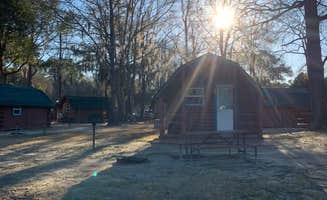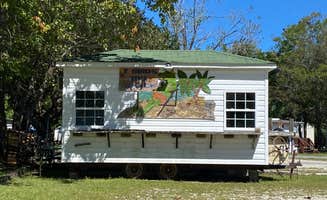Buck Hall Recreation Area offers tent camping and RV sites in addition to glamping options. Campsites sit near a boat ramp and fishing pier on the Intracoastal Waterway. According to camper Natalie B., "This is a gorgeous spot on the water but can get buggy. Mostly RV spots with less than 10 tent spots." The campground serves as the coastal terminus of the Palmetto Trail and provides access to the Francis Marion National Forest.
What to do
Kayaking without booking a tour: Launch directly from Buck Hall Recreation Area for self-guided paddling. "We had a blast kayaking around and had some awesome dolphin encounters," notes one visitor who stayed at the campground.
Fishing from shore: The fishing pier at Buck Hall Recreation Area lets anglers catch without a boat. As Brandon D. warns, "There is a boat ramp located nearby but there is no access to go swimming here. There are lots of oyster beds lining the rocks."
Visit nearby wildlife areas: The Sewee Visitor Center houses red wolves and offers educational programs. "The nearby Sewee Visitor Center has red wolves and is free to visit. They also have RV parking! You can call ahead and find out when they will be feeding the wolves," suggests one reviewer.
Explore McClellanville: This small fishing village has historic homes and local seafood restaurants within 10 minutes of camping areas. TW Graham's restaurant gets mentioned by multiple campers as worth the visit for fresh seafood.
What campers like
Waterfront views: Huntington Beach State Park offers beautiful marsh and ocean views. Werner S. says, "The beautiful beach is just at your doorstep and nature on the other site. We loved the combo."
Wildlife watching: Dolphins, birds, and even alligators can be spotted from campsites. One camper mentions, "We had awesome dolphin encounters" while kayaking from Buck Hall.
Fishing opportunities: Multiple fishing spots exist for different skill levels. "Good for boating and fishing," writes Werner S. about Buck Hall, which has "a good ramp for boating and a pier for fishing."
Seasonal quiet: Off-season camping means fewer crowds but still comfortable temperatures. "We spent three nights here as a base for our trips into Charleston. With our America the beautiful senior pass, I think it was only like $50 for three nights," notes Lisa M. about her stay at Buck Hall.
What you should know
Insect precautions required: Mosquitoes can be intense, especially near water. Werner S. advises, "Don't forget your bug-spray, mosquitos are aggressive here."
Limited swimming options: Honey Hill Campground and other inland sites don't offer swimming. As Brandon D. warns about Buck Hall, "This campground is located directly adjacent to the Intercoastal Waterway...but there is no access to go swimming here."
Summer heat: Prepare for high temperatures and humidity from June through September. The tent sites at Buck Hall "have a good breeze, but once you get back into the trees the mosquitoes can be very bad," according to Brandon.
Reservation recommendations: Book well ahead for holiday weekends and summer months. Sites at Buck Hall are limited, with "less than 10 tent spots" available according to Natalie B.
Marine hazards: Be aware of oyster beds and tidal areas. "There are lots of oyster beds lining the rocks that are serving as a perimeter to the waterway, so scrambling through can be hazardous if you go down there," cautions Brandon D.
Tips for camping with families
Visit during spring or fall: Mount Pleasant-Charleston KOA offers milder temperatures and fewer bugs during shoulder seasons. Crystal C. reports, "Camped at site 32 in mid-November and site and grounds were both beautiful and very well kept."
Consider glamping options: For families new to outdoor stays, glamping offers comfort with nature access. According to Alex R., Honey Hill Campground has "very big campsite[s]" with space for "tent, Car or RV" camping.
Pack extra clothing: Coastal humidity can mean damp clothes, especially with kids. One campground even offers laundry services for families on extended stays.
Plan indoor backup activities: Summer thunderstorms can interrupt outdoor plans. The Charleston area has museums and indoor attractions within 30-45 minutes of most campsites.
Wildlife viewing strategies: Early mornings offer the best wildlife sightings with fewer people around. As one reviewer mentions, watching for dolphins is a highlight for many children.
Tips from RVers
Campsite selection: At James Island County Park, "the best sites in this RV exclusive campground are those on the perimeter with the best sites being the ones without anything behind them, specifically on the NW periphery with sites #46 - 55," advises Stuart K.
Level pads available: Buck Hall has "water and electric" hookups with "nice and tidy" facilities. Lisa M. notes, "All the spaces had water and electric. The showers were nice and tidy and the water pressure in the showers was great."
Boat access considerations: "Trailering your boat will force you to pay for an RV site," explains Eric K. about Buck Hall Recreation Area, which has a "boat landing [that] is deep enough to drop a large boat into the drink."
Seasonal planning: Eric K. recommends, "Best time of the year is Fall, Spring, and Winter" for RV camping at Buck Hall due to lower temperatures and fewer insects.



